Tribeca 2019: Interview With SEE YOU YESTERDAY Director Stefon Bristol
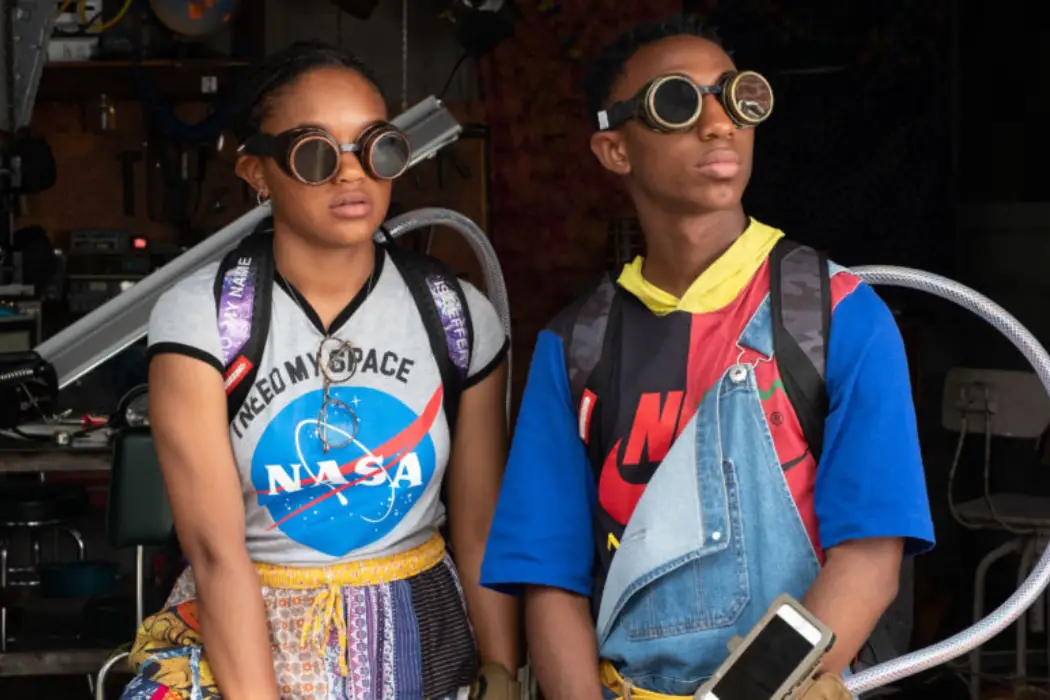
Stephanie Archer is 39 year old film fanatic living in…
I had the amazing opportunity to speak with Stefon Bristol during my time at Tribeca, an up-and-coming director who has powerful and thought provoking stories to tell. While we talked about the more serious nature behind his film, See You Yesterday, we also shared a few laughs regarding Michael J. Fox on set and time travel.
Stephanie Archer for Film Inquiry: Hello! I want to thank you for taking the time to speak with me today and congratulations on your film, See You Yesterday.
Stefon Bristol: Thank you so much. I thank you for inviting me for an interview, I really appreciate that.
Of course! As youre release Friday approaches, do you find yourself reflecting at all on the journey that led you up to this point?
Stefon Bristol: Yes, I have been doing a lot of reflection. [laughs] Thinking about these past five years and during the shoot and what not and all the mistakes I’ve made as a filmmaker during my first feature film, all my rookie mistakes, and how lucky I am to have had an amazing editor who taught me a lot about storytelling itself and helped me really tell a good story. And then just the amazing teamwork of all the producers Matthew Myers and Jason Sokoloff, they were very nurturing and and not really knowing who I am and just trusting me, and we all became good friends. And they really taught me the game of filmmaking, taught me how to budget and the union rules, and the cast and everybody helped me out. You realize how much of a team it takes to make a good movie because a movie is a living, breathing organism.
I like how you word that, that films are a living, breathing organism because they really are. They’re so fluid. What made you want to become a filmmaker?
Stefon Bristol: When I was growing up, I fell in love with just watching movies and you know I always loved to watch Jurassic Park, I was always watching the director’s commentaries, all the special behind the scenes footage that they had on the DVDs and I saw this guy named Steven Spielberg ordering people around and really have a hand in the creative process and you know, you see a big giant camera swooping around and everything. I said I want to do that but it wasn’t until I was 18 years old when I saw Do The Right Thing for the first time that I knew exactly what my calling was.
What I appreciate about that film is it not only reminds me of my childhood but it was like okay, here’s black life but black life differently and how nuanced black people are, how different and that sort of sparked the idea that I wanted to do that. So like trying to figure out how to make action or adventure movies, but for black people. And since 18, I’ve been trying to do that. And here I am.
And where did the idea for this specific film come from?
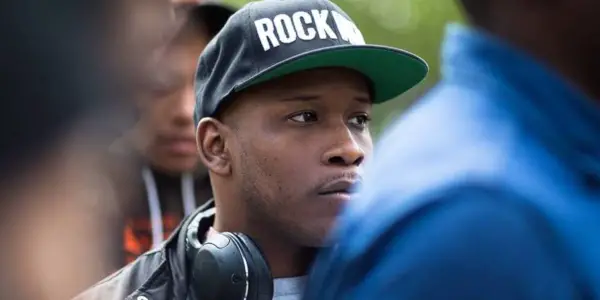
Stefon Bristol: When I was in NYU graduate film school, you have to graduate as a director – you have to make a film, right. And throughout my years, I wasn’t happy with the short films I was making. I was trying to make a feature film to graduate, but my professors let me know that I’m not ready to make a feature unless I make a pretty strong short. And with the type of film I wasn’t exposed to, I had to go back to the root of my love of film. And as I mentioned, the adventure, and I wanted to do something like that. So, I developed the idea of See You Yesterday in December of 2014 when Mike Brown got murdered, that led in to my script. I was writing something completely different. I was writing about a kid who is trying to save his best friend from being killed by his grandfather who was driving drunk one time.
But these murders wouldn’t have made it into my script if I hadn’t seen the police brutality and my professor looked at my script and said, look, you have a very timely and topical scene right here. Either let that be the story or take it out. I can only guess that these are going to keep happening, so I am going to focus on police brutality and I did the short for it in the Bronx with Fredrica Bailey, my co-writer, because I needed a black woman’s voice to help me shape this character who is a black woman. Thank God it became successful and we were able to make the feature.
And how has it been to have a Spike Lee a part of your first full length feature?
Stefon: Bizarre. It’s weird. He is the one who sparked the conviction that I need to be a filmmaker, by just watching one film alone. I watched Do The Right Thing and I was like, that’s it, that’s my calling. And now, I am working with my hero. It’s so bizarre. It’s a blessing at the same time, only, God, you know, God works in mysterious ways. I’m blessed and honored and psyched, I still pinch myself every day. You know, I could just spend five hours on this phone right now, there’s so many stories I could tell you. It’s weird.
I’ve read that, speaking of science and action movies, you’re a fan of Back to the Future.
Stefon Bristol: Yeah, I grew up on that movie man.
What was it like having Michael J. Fox on the set of your film – a film about time travel?
Stefon Bristol: That was the best day of my life, and I shit you not, that was literally just the best day of my life. When I was working with him, we had him for the original principal photography day but that morning he broke his arm and he ended up having to go to the hospital and we shot that scene with another actor – all respect to him, he’s a great actor. At first I was like, I don’t want to bother him, he is probably still recovering from the accident. And then Spike sat down with me and said no, we are going to shoot this – you’re crazy. [laughs] And I’m glad he pushed me to reach out to Michael and it was the best day of my life. Honestly, the moment I sat down on my director’s chair, you look at the director’s monitor after they slated and I was supposed to call action, it was like, it was a weird pause, I was looking at the slate, you know, everyone’s quiet. I’m just looking at the monitor, I’m like, I can’t believe I’m directing Michael J. Fox. [laughs]
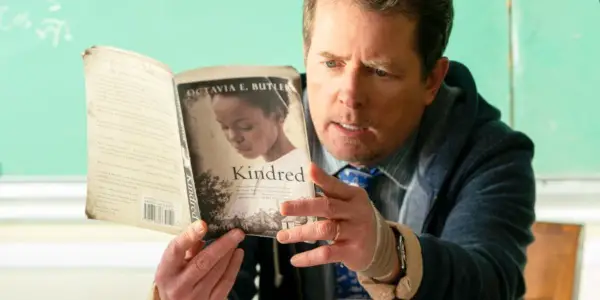
It’s my first feature film. This is super weird. And between the setups, I had a little moment with Michael, while people are switching lenses and moving the camera for the next position, I talked to Michael – Michael what do you think of the script? He said he didn’t read it. [laughs] you didn’t read it? “I did it off the letter you sent to me.”
When I wanted to get Michael, one of the processes was to just write him a letter to tell him how important it is to have him in the film. Tell him how his position as a teacher will reflect on other teachers from around the nation to pay attention to minority students in the classrooms and how brilliant they are. And he responded to that and he said, yeah man, I would love to this, and I just did it off your letter. My heart melted, my heart melted and I’m in love with guy and I’m extremely humbled.
From the moment he was on screen, I was really hoping that there’d be some other reference to the Back to the Future franchise and him saying, “Great Scott” was a real treat. Just layer on layer of that.
Stefon Bristol: Yo, okay so that was not scripted. That is not scripted. What happened is we wrote another line. We told him like “Time Travel, you got to be kidding me” – that was the line. And we shot the scene the way it was scripted. And I’ve told Michael and Eden Duncan-Smith look, you know, we got it, you can do whatever you want. And while I call action, they do the whole scene and the rest they did adlibs and the first adlibbed line was “Time Travel. Heavy”. Everybody lost it. [laughs] I said, okay, let’s go again. You know, when he said heavy, I felt like yelling and everything, I had to remind the crew we gotta keep it cool. Then we do it again and he did the “Great Scott” line and I couldn’t contain my excitement. It was crazy. So that was not scripted. You know, he did it all on his own, his own lips.
That was perfect. It was an absolute perfect moment in the film. Speaking about other moments that stick out in the film, there’s a lot of references to Jamaican culture. You have the country’s flag on the domino board. You have a lot of reggae music. There’s even a reference to Babylon. Why was this such a vital element throughout See You Yesterday?
Stefon Bristol: It’s not Jamaican culture.
Okay.
Stefon Bristol: Is all Caribbean Culture. I am Guyanese by descent. So this is the whole Caribbean. My parents are from Guyana and I grew up in Brooklyn. I grew up in Coney Island we would often go to East Flatbush, to get our cultural food, which is like, you know, Beef Patty and Coco Bread. And I just, when I came back to New York for graduate film school at NYU, I would go back to the neighborhood that I loved going to growing up and me being Caribbean, I had never seen American Caribbean people on screen before. Whenever there is a movie about Brooklyn, it’s always a bad side for black people. Not lately, since gentrification happened, and the whole hipster movement has happened, if there is a film it is always in Williamsburg or Bushwick. Like yo, this is kinda corny. This is not the Brooklyn I know and love. There are movies for the Black American experience but not the black immigrant experience. I want to show that perspective too. It would be wrong of me if I don’t celebrate my own Caribbean heritage. So thats important to me.
There are so many layers in your film calling out social injustices as well as addressing diversity in film. Was your lead CJ, was she always a female scientist?
Stefon Bristol: Yes, always a female scientist. From draft one. The funny thing is the lead was always Sebastian. At first, way before it was Sebastian, I switched it up because her character keep talking to me to make her more versatile because she’s the one who has to go through the pain, she has to fight for her brother’s death all the time. And seeing a young black girl wanting to be a scientist, wanting to be a successful scientist, it just really adds value to what influence that this film can have for young black people and also value for young kids to recognize other brilliant black scientists that have contributed to our society.
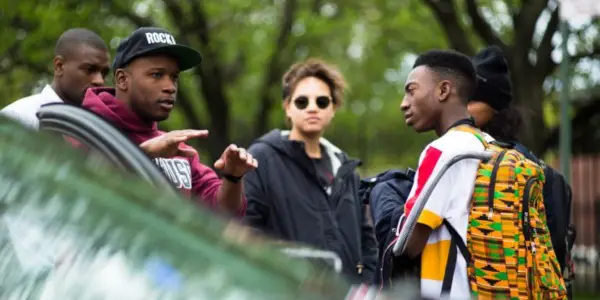
There’s many, many, many. I mean the man who created the super soaker is a black man. You know, he is the one who created that huge cultural phenomenon. Not a lot of people know about that. Not a lot of black people know about him. I hope this triggers to young black people that being a musician is great and being a ball player is cool but being a scientist is just as good as these aspirations. We need more people to go into the sciences, we need more people of color going into the sciences.
In the film, it’s mentioned to CJ that she needs to “act right”. I thought that was really, really a very strong point in the film, also showing some of the consequences of not “acting right,” depending on how society interprets that. How important was it to you to have that resonate throughout your film?
Stefon Bristol: Right, I’ve heard that “acting right”. What is that definition of acting right? Often black women, and also black men, have been told to act right. What does that mean? I find it a little insulting and disturbing because you have somebody who has their own mind and you are trying to contain them, you are not allowing them to forge. And also, I want her character to symbolize for young black people they gotta be unapologetic and whatever you need to do. Express it towards police brutality. You have to be unapologetic. You have to be an individual. We cannot give up what we want and what we need. What’s going on in American society right not, there’s so many things that’s troubling us and we if we can just focus on that. Our focus is all over the place.
I put myself in the position to remind everybody that police brutality is still happening. I mean, I just read an article that three young kids were shot by police officers through the car and not so long ago, you have a young black man having his face slammed to the ground just picking somebody’s cellphone up. And there still a lot of this happening. And you know what? I’d be happy to come to you to be angry. You have to express concerns. You have to continue to ask questions. We have to be unapologetic about that. And it’s something beautiful about being unapologetically black. Why does our culture have to feel like a threat because you don’t understand it. I think that’s why I have her character be stern, being stubborn as well, because you got to accept her for who she is and she might make mistakes, but if you want something done you gotta do it.
Another message I seemed to notice throughout the film, and maybe it’s just me, is this message that you can’t change the past, but you can change the future. How do you see this translating to our present society?
Stefon Bristol: I don’t, I don’t want to give away my personal reason why I chose the ending to be. I want so hard to answer that or, but at the same time, it’s like if I answer that, people won’t rely on what their interpretation of the ending is and I’m not ready for that.
Okay, perfect. Beyond just the ending, or the few things that we’ve talked about, what do you hope audiences will take away from this film?
Stefon Bristol: Same answer. [laughs]
Okay, fair enough.
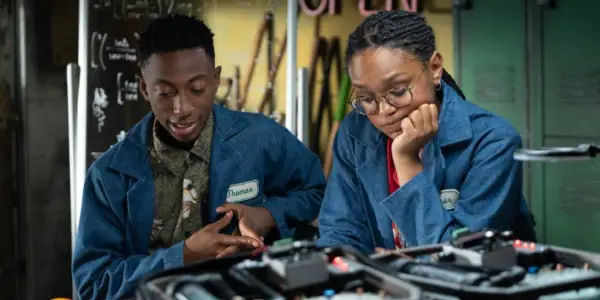
Stefon Bristol: Okay, I’ll say this. Besides the ending, I hope the audience takes away that oftentimes when the media shows black people getting shot that they often try to find blemishes within peoples’ character. You know what I’m saying? And I don’t want that kind of narrative. And with these kids, they hardly have any blemishes, that when the inevitable happens in the film, you love these kids, you hope that that they achieve their goal, and you get to know them as people, as a person, you know, you love them just as much as your best friend. So that’s what I hope that the audience will take away.
If you had a time machine, what is the one thing you would like to go back and change?
Stefon Bristol: I want someone else to be the 45th President of the United States. [laughs]
[laughs] That’s a really good answer.
Stefon Bristol: Seriously though, I won’t change anything because everything that has happened in my life, resulted to where I am today.
We’ve talked about working with Michael J. Fox and Spike Lee for this project. Is there anyone else in the industry that you’re hoping to work with in the future?
Stefon Bristol: A whole bunch of people I want to work with in the future. [laughs] I don’t even know how to answer that question. Who would I want to work with in the future? That’s wild. That’s a good question. Wow. You stumped me on that one. I’m going to keep that a secret for now. That’s a very good question.
Any future projects we can look out for going forward?
Stefon Bristol: Yes, I am in development with a script my cowriter wrote about a young African American from, it takes place in World War II were a young African American soldier returns home to get his niece after he found out his sister had been killed, and when he gets his niece, he realizes the mafia wants her. So I’m working on that with my co-writer and I’m working on an alien invasion movie that deals with African mythology.
Film Inquiry would like to thank Stefan Bristol for speaking with us!
See You Yesterday will be available for streaming on Netflix May 17, 2019.
Does content like this matter to you?
Become a Member and support film journalism. Unlock access to all of Film Inquiry`s great articles. Join a community of like-minded readers who are passionate about cinema - get access to our private members Network, give back to independent filmmakers, and more.












